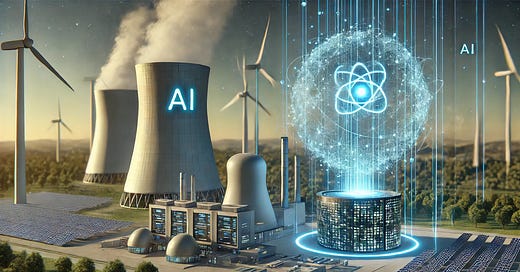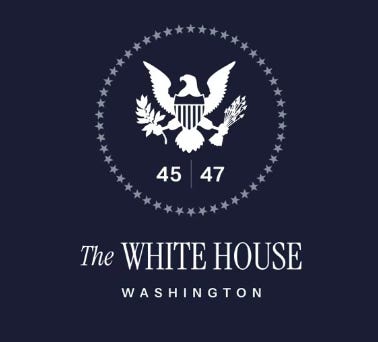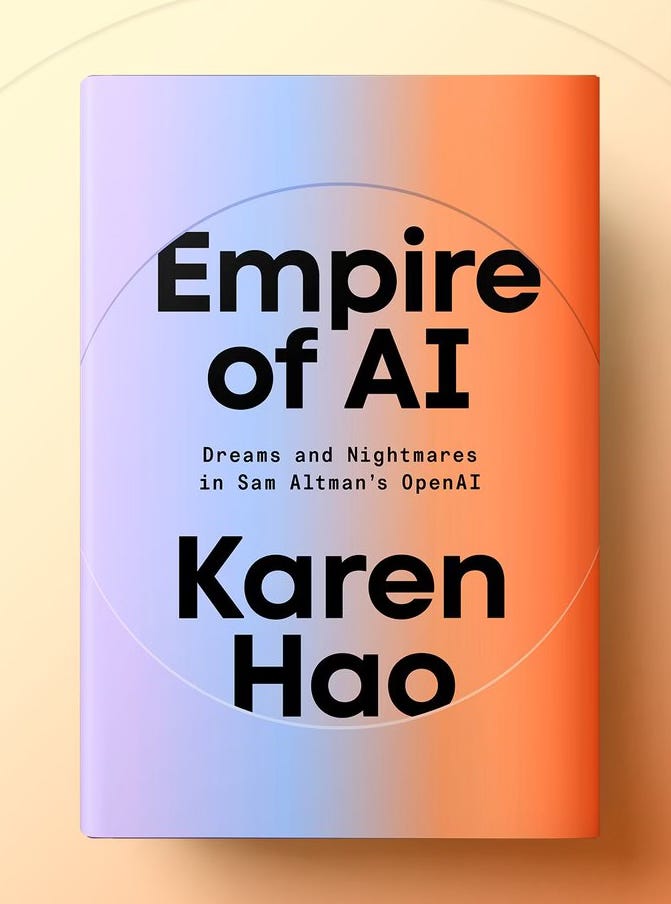(source: WebMagic Informatica)
Issue No. 152
Welcome to the latest issue of Carbon Creed - a newsletter about carbon, technology, and values.
The past week in has been dominated by a series of significant policy shifts, with a particular focus on reorienting the nation's energy strategy. Leading the news, the House of Representatives narrowly passed its "One Big Beautiful Bill," which is poised to significantly impact the clean energy sector. This controversial legislation proposes to cut Investment Tax Credits (ITC) and Production Tax Credits (PTC) for clean energy projects, sparking concerns about its potential to hinder ongoing clean energy development and investment.
We begin this issue with an opening Preamble focused on a core creed - the Ethics Creed - and why it is a necessary and crucial lens to help shape nuclear policy and artificial intelligence (AI) development.
We hope you enjoy the discussion!
If you have an opinion on any topic covered in this newsletter, please feel free to leave a comment below.
Thank you for your viewpoint and the value of your time.
Preamble
Ethics
“Society is defined not only by what it creates, but by what it refuses to destroy.” - John Sawhill
In my book The Carbon Creed, Ethics provides a compelling framework for understanding how zero-emissions nuclear energy and artificial intelligence intersect in our climate response. Both technologies embody the creed's emphasis on intergenerational responsibility and the moral imperative to act decisively on climate change, yet they also illuminate its warnings about technological hubris and unintended consequences. Nuclear power offers the promise of massive clean baseload energy generation essential for decarbonization, while AI could optimize grid management, accelerate clean energy deployment, and enhance nuclear safety systems. However, the creed's call for humility and precaution resonates strongly when considering AI's enormous energy demands—which could paradoxically undermine climate goals—and nuclear power's persistent challenges around waste storage and accident risk.
The ethical framework suggests that deploying these technologies requires not just technical mastery but also democratic deliberation about who controls them, how their benefits and risks are distributed, and whether they truly serve the broader goal of planetary stewardship rather than merely extending existing power structures under the guise of climate action.
POLICY
Trump Goes Nuclear
On May 23, 2025, President Donald Trump signed four executive orders (E.O.) aimed at revitalizing the U.S. nuclear energy sector. These directives seek to quadruple the nation's nuclear power generation capacity over the next 25 years, addressing the surging electricity demands driven by artificial intelligence (AI) technologies and data centers.
The Four Executive Orders at a Glance
Reforming the Nuclear Regulatory Commission (NRC)
This order mandates the NRC to streamline its licensing process, requiring decisions on new reactor applications within 18 months. It also calls for a reevaluation of existing radiation exposure standards to facilitate the development of advanced nuclear technologies.Deploying Advanced Nuclear Reactor Technologies for National Security
This directive authorizes the construction of nuclear reactors on federal lands, particularly to support military installations and AI data centers. It designates AI data centers as critical defense facilities, emphasizing the role of nuclear energy in national security.Reinvigorating the Nuclear Industrial Base
Aimed at strengthening the domestic nuclear supply chain, this order invokes the Defense Production Act to secure nuclear fuel resources and encourages the development of small modular reactors (SMRs). It also seeks to attract private investment into the nuclear sector.Reforming Nuclear Reactor Testing at the Department of Energy (DOE)
This order facilitates the testing of new reactor designs at DOE laboratories and expedites the deployment of three experimental reactors by July 4, 2026. It aims to accelerate innovation in nuclear technology.
The Executive Orders mark a decisive shift in U.S. energy policy, emphasizing the role of nuclear power in achieving energy independence and technological superiority. By embracing innovation, streamlining regulations, and fostering public-private partnerships, the United States seeks to lead a global nuclear renaissance.
Walter’s Take:
First of all, I’m not a hater.
Nuclear energy offers compelling advantages as a clean, reliable power source that could transform America's energy landscape. Unlike intermittent renewables, nuclear provides continuous base-load electricity while producing zero emissions, making it crucial for decarbonization efforts amid surging AI and data center power demands. The technology promises substantial economic benefits through billions in investment, tens of thousands of jobs, and positioning the U.S. as a global leader in next-generation reactor designs like Small Modular Reactors.
However, significant challenges threaten nuclear expansion. Accelerating reactor approvals to 18 months raises safety concerns about rushed regulatory reviews, while the persistent lack of a permanent waste storage solution continues to fuel environmental opposition. The technology's capital-intensive nature creates financing hurdles that may require sustained federal backing to overcome market reluctance.
Perhaps most critically, nuclear energy faces a perception problem rooted in decades of public skepticism following high-profile accidents. This cultural stigma, combined with political polarization around the technology, could derail siting and permitting efforts regardless of technical merits. Success will ultimately depend on whether policymakers can maintain consistent support while rebuilding public trust in nuclear safety and waste management.
BOOKS
\
EMPIRE 0F AI
By Karen Hao
Karen Hao's "Empire of AI" delivers a compelling and sobering examination of how artificial intelligence has become a tool of corporate and geopolitical power rather than the democratizing force many initially envisioned. As a former senior AI reporter for MIT Technology Review, Hao brings both technical expertise and journalistic rigor to her analysis of AI's evolution from academic curiosity to a technology that increasingly shapes global power dynamics. Her central thesis—that AI development has been captured by a small number of tech giants who prioritize profit and control over societal benefit—is supported by meticulous research and insider access to the industry's key players.
The book excels in its detailed exploration of how companies like Google, Meta, and OpenAI have consolidated control over AI development through massive computational resources, proprietary datasets, and strategic talent acquisition. Hao skillfully traces the shift from open research culture to secretive corporate labs, illustrating how the democratization of AI has given way to what she terms "AI colonialism." Her analysis of the geopolitical implications is particularly insightful, examining how AI supremacy has become intertwined with national security concerns and economic competitiveness, particularly in the US-China rivalry.
What sets "Empire of AI" apart from other tech criticism is Hao's nuanced understanding of the technical challenges and her ability to connect abstract algorithmic concepts to concrete social consequences. She demonstrates how biased training data and opaque decision-making systems perpetuate existing inequalities while creating new forms of discrimination. Particularly compelling is her examination of AI's environmental costs, including the massive energy consumption required for training large language models and the proliferation of data centers that consume electricity at rates comparable to small countries. Hao effectively argues that the environmental externalities of AI development—from carbon emissions to water usage for cooling—represent another form of inequality, as these costs are borne by communities while profits accrue to tech giants. Her reporting on AI's impact on labor markets, surveillance capabilities, and democratic institutions is both thorough and accessible, making complex technical subjects understandable to general readers without oversimplifying the underlying issues.
Walter’s Take:
Hao's "Empire of AI" stands as an essential contribution to our understanding of artificial intelligence's trajectory and its implications for society. While the book's tone is constructively critical, it avoids techno-pessimism by offering concrete suggestions for regulatory frameworks and alternative development models that could redirect AI toward more equitable societal outcomes. For policymakers, technologists, and citizens grappling with AI's rapid advancement, this book provides the historical context and analytical framework necessary to engage meaningfully with one of the defining technological challenges of our time.
RESOURCES
Currents a podcast featuring in-depth discussions with experts on clean energy and finance, published by Norton Rose Fulbright.
Canary Media is an independent, nonprofit newsroom covering the transition to clean energy and solutions to the climate crisis






